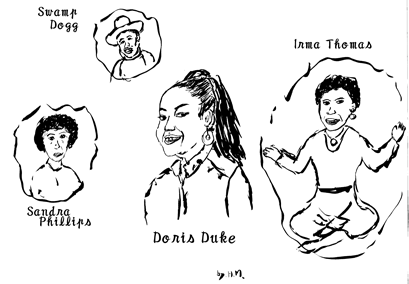

When he produced male singers including himself, many of Swamp Dogg's lyrics went with the times of around '70 in the way of stressing his own statements on them in the political or social viewpoint, while his outlook on the family or the female was still conservative or earthy. Meanwhile, many of his lyrics for female singers, it seems to me, were put on the story of a woman who was out of the road for typical happiness, that is, who was in divorce or in immorality or unmarried and with children. New Orleans R&B queen Irma Thomas' compilations of the '70s "A Woman's Viewpoint" mainly contains his productions such as ones from the album "In Between Tears" on Fungus imprint. The words which were thrown to a man in the ending of She'll Never Be Your Wife is so frank that women in the same status should releive their feeling. I had nothing to be remembered by the lyrics, nevertheless, I was astonished at it in my first contact. While Irma Thomas actually experienced similar difficulties, there was a woman who played her own role better in the Swamp's story, though I'm not sure she lived her life like the role. Swamp Dogg, who wandered from small labels to labels, brought out a masterpiece album starring Doris Duke whom I pick up here. (Another female singers produced by Swamp Dogg are heard on "Swamp Dogg's Southern Soul Girls", the compilation of Sandra Phillips and Bette Williams. Both of them have fine soulful voices. )
Doris Curry was born in Georgia the south and polished her voice in church. After moving to the north, she did some backing works as a session singer and chorus at the Apollo Theater in New York. If you consider her career, you may imagine she would have had a sophisticated pop voice. She was also said to be occasionally invited by Kenneth Gamble and Leon Huff before they launched Philadelphia International. In Jerry Butler's tunes featuring female choruses such as Hey, Western Union Man or Only the Strong Survive, which you can hear on "The Philadelphia Sessions", she might have joined despite the absence of the stuff's name including her on the credit. According to her compilation with Swamp Dogg tunes "I'm a Loser", however, she also shows her personality on some sides such as Too Much to Bear from Jay Boy label in the name of Doris Willingham, who had just married and changed her family name : they show her bluesy feeling and explode her emotion in her gospel delivery contrary to the sophisticated pops backing. Just like those with voices in gospel roots who lived in the north and relied on the southern sound for their success, Doris Logan, who had just remarried, was allured by an A&R man Swamp Dogg and released some tunes from the brand-new label Canyon, in the name of Doris Duke after a daughter of the famous Tobacco King.
1969 was the year of transition for the southern soul from simple and natural compositions to more complicated ones : not only with the original loose and tight rhythm and horn sections of Muscle Shoals but with strings or with pre-southern rock arrangements. In addition to such backings, the lyrics written not always first-issued for her but in the overspreading theme of 'unrequited women', and above all Doris Duke's emotional and persuasive alto voice : such elements conjure up the unity in twelve tunes of "I'm a Loser", like a book well worth reading. This begins with He's Gone introduced by a piano and snare rim shots and backed by the steady and calm arrangement which put stress on her vocal. Her clearly uttered lines incerted in Feet Start Walking knock me down. Duane Allman's guitar solo is wise to interact with her voice on Ghost of Myself. And this ends with frank but pretty speaking about infidelity on To the Other Woman. This is so wonderful a stuff that almost all things as much as you desire are played in time. It's sad that this album never reached ordinary people's ears because of Canyon's short life of one and a half years. Wishing "the dream come true again", she had the second chance to team with Swamp Dogg on the album "A Legend in Her Own Time" cut from Mankind label in '71. It's not so bad for the opening tunes such as I Wish I Could Sleep, though, it seems to me that the producer reduced his creativity because of financial problems when I listen to the latter part of the album, including If She's Your Wife (Who Am I), the answer song of To the Other Woman or the readings of others' hits. Without the efforts of promotion, Mankind folded in a short time.
Despite moderate sales, she could get little reward from labels which went bankruptcy in a row. Moreover, she could not put trust in Swamp Dogg. After leaving him she kept on working and finally cut some sides in the UK where there were frantic fans but in vain. The UK album at Contempo, "Woman", is largely influenced by pre-disco Philly Soul. Greatly disappointed, she retreated from the show business and she is now heard to sing at church weddings or christenings occasionally in New Jersey. Today's Japan sometimes calls unmarried persons as 'loser-dogs'. But such self-humiliating or self-mocking is seldom sublimated to the clarity like Doris Duke's voice even in any country. Whether the inconvenience things get another meanings depends on the way and the strength of the player who talks about them. And then those who are in fear of their own humble skill often talk so big. I feel so these days. (2006/10/12)(2010/02/14)